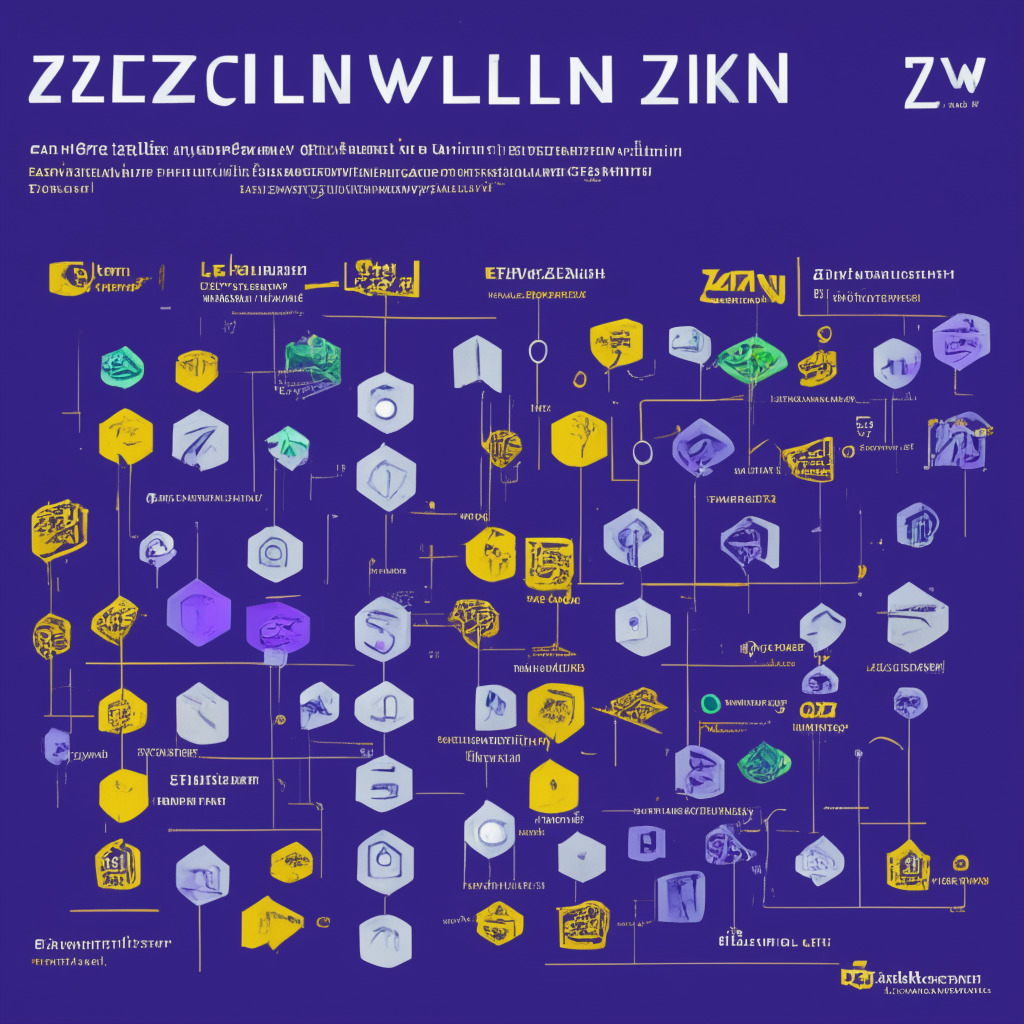The United States Court of Appeals for the Third Circuit has retained jurisdiction in Coinbase’s pursuit of regulatory clarity from the SEC, demonstrating the importance of transparent crypto regulations. This development marks a potentially pivotal moment for the future of the cryptocurrency industry in the United States, as the forthcoming SEC report could significantly impact the market.
Search Results for: RSI
National AI Commission Act: Balancing Innovation and Consumer Safety in AI Development
The National AI Commission Act, introduced by U.S. lawmakers, aims to establish a regulatory framework for AI technology by bringing together experts, government officials, industry representatives, and labor stakeholders to provide effective AI regulation, addressing concerns and potential risks associated with AI development and use.
FTX Bankruptcy Legal Fees Skyrocket: Unregulated Crypto Exchanges Under Scrutiny
FTX’s bankruptcy announcement has raised concerns over legal fees surpassing $200 million. The cryptocurrency exchange’s unregulated status and lack of corporate governance contribute to these expenses. Independent auditor Katherine Stadler advises cost-conscious approaches for better results and highlights the need for robust governance structures in the crypto world.
Giant Asset Managers Enter Crypto ETF Race: Opportunities, Challenges, and SEC Battles
WisdomTree Investments recently filed an application for the ‘WisdomTree Bitcoin Trust’ with the SEC, following Blackrock’s ETF application. These filings signal increased interest in cryptocurrency from major financial institutions, but highlight existing regulatory issues faced within the industry.
EU AI Act Compliance Crisis: How LLMs Fall Short and the Road to Improvement
A recent Stanford University study reveals a concerning lack of compliance with the EU AI Act among large language models, including GPT-4 and Google’s Bard. Researchers ranked ten major model providers on their adherence to the 12 requirements outlined in the AI Act, finding a pressing need for improvement even among high-scoring providers. The study highlights transparency and accountability as crucial aspects of responsible AI deployment.
HV-MTL Forge: Can Yuga Labs Sustain NFT Gaming Hype and Validate High Valuations?
Yuga Labs announces HV-MTL Forge, a workshop-building game centered around Bored Ape Yacht Club’s robot NFTs, set to launch on June 29. Owners of Sewer Pass NFTs can access the Forge game, where they customize workshops to secure community votes. The game builds upon the success of Yuga Labs’ controversial Dookey Dash, which generated $110 million in NFT trades.
Ava Labs Integrates AvaGPT to Enhance User Support: Innovation Meets AI Limitations
Ava Labs introduces AvaGPT, employing OpenAI’s ChatGPT technology to provide quick assistance to Avalanche users while ensuring complex queries are handled by their customer support. Through a partnership with Kapa AI, AvaGPT becomes an integral part of Ava Labs Core platform. However, Ava Labs acknowledges AI limitations and maintains transparency on the accuracy of chatbot information.
AI Crackdown on Chicken or Egg Debate: Boon or Bane for Philosophical Discourse?
AI, like ChatGPT, tackles the chicken-or-egg conundrum with a concise “Egg,” aligning with scientific consensus. While AI’s potential to simplify and inform on philosophical debates is remarkable, it’s crucial to maintain human critical thinking and discourse for comprehensive understanding.
Polygon PoS Upgrade to zkEVM Validium: Security vs Scalability vs Decentralization Debate
Polygon co-founder Mihailo Bjelic proposes an upgrade to the Polygon PoS network, suggesting a shift to a “zkEVM validium” version for increased security through zero-knowledge proofs. This upgrade would enable Polygon zkEVM for high-value transactions, offering lower fees and enhanced security from Ethereum’s features, targeting applications like Web3 gaming and social media.
Exploring Polygon PoS Upgrade to zkEVM Validium: Scalability, Security, and Future Prospects
The Polygon Labs engineering team proposed an upgrade to Polygon Proof-of-Stake (PoS) sidechain, transitioning to ‘zkEVM Validium,’ an Ethereum-secured Layer 2 network secured by zero-knowledge proofs. Targeted for Q1 2024, this upgrade aligns with Polygon 2.0’s vision and aims to enhance scalability, security, and interoperability within the broader cryptocurrency ecosystem.
Biden’s AI Summit: Balancing Innovation, Regulation, and Blockchain Implications
President Joe Biden is set to meet with AI experts to discuss the future of artificial intelligence and the need for legislation and guidelines. This comes at a time when the U.S. government has yet to establish a comprehensive strategy for AI development and cryptocurrency regulation, while Europe, China, and the United Kingdom have already made progress in these areas. The meeting aims to address concerns on policy, regulation, and balancing innovation with safety and risk mitigation.
Bitcoin’s $27,000 Struggle: Analyzing the Inverted Hammer and Potential Sell Opportunities
Bitcoin faces a crucial resistance level at $27,000, with speculations of selling pressure increasing due to an inverted hammer candlestick pattern. Observing this level is vital, as it could determine Bitcoin’s future trajectory in the ever-evolving digital currency landscape.
Regulatory Debates Shape Crypto’s Future: Institutional Adoption and Tokenization at Stake
A recent survey by crypto company Laser Digital revealed that 82% of respondents hold a positive view of the digital asset class, with optimism for Bitcoin and Ether performance. However, 90% prefer investment vehicles backed by large traditional financial institutions, highlighting the need for increased regulatory clarity and market experimentation for digital assets and traditional finance to coexist and benefit investors.
MSc in Metaverse: Pioneering Education or Premature Investment in Emerging Tech?
The University of Nicosia (UNIC) introduces a Masters of Science in Metaverse degree, covering metaverse design and management, AR, VR, NFTs, blockchain, and more. While aiming to address the growing interest in metaverse technology, this ambitious program also sparks skepticism due to its nascent nature.
Data Act’s Impact on Blockchain: EU’s Reassurance vs Industry Concerns
The European Commission addressed concerns about the Data Act’s impact on blockchain technology and smart contracts, claiming the law shouldn’t pose issues for smart contract software vendors. However, fears persist that the law’s scope could unintentionally extend further, affecting public permissionless networks and undermining the core of trustless transaction environments.
Crypto Market Downturn: Top Altcoins to Buy the Dip and Their Recent Developments
The crypto market experienced a significant sell-off in June, with major cryptocurrencies falling to monthly support levels. This provided traders opportunities to buy well-established altcoins like XRP, Polygon (MATIC), and Cardano (ADA). Binance CEO CZ confirmed progress on Bitcoin Lightning Network. Conduct thorough research before investing.
Japan’s Crypto Leverage Debate: Balancing Industry Growth and Investor Protection
Japan’s crypto exchanges seek to increase the permitted leverage for retail investors due to a significant drop in annual margin trading volume. They aim to propose leverages ranging from four to ten times. Updated leverage rules could promote industry growth and maintain investor protection, but exchanges must justify the increase while aligning with government objectives.
Ethereum Explorer Etherscan Integrates AI: A Boost to Blockchain R&D or Risky Move?
Ethereum blockchain explorer Etherscan has integrated AI technology in its newly launched Code Reader beta version, aiming to simplify blockchain research and development. Etherscan’s AI-powered Code Reader allows users to understand smart contract integration with decentralized applications, though potential inaccuracies warrant cautious use and verification.
Generative AI: Democratizing Creativity or Displacing Artists? Pros, Cons & Copyright Dilemma
Generative AI, like ChatGPT, democratizes the creative process, aligning with Web3 decentralization ideals. Tools such as DALL-E and StarryAI enable users without artistic background to create AI-generated NFTs. However, concerns about job displacement, copyright issues, and ownership of AI-generated works persist, leaving the legal status uncertain.
MATIC Price Uncertainty: Analyzing Symmetrical Triangle Pattern & Market Indicators
The MATIC price moves sideways after early June’s bloodbath, indicating no clear dominance from buyers or sellers. A symmetrical triangle pattern reveals potential for a rally during this uncertainty, but a bullish breakout from the resistance trendline is needed for significant recovery.
Massive Crypto Heist Sparks Debate: Transparency vs Security in Blockchain Technology
Hackers targeted Atomic Wallet, stealing $35 million and using THORChain to launder their gains. Blockchain analysis firm MistTrack tracked the stolen funds, exposing the transparency of blockchain technology. Yet, concerns about digital asset security and decentralization misuse persist.
Binance Lightning Integration: Future of Crypto or Centralization Concern?
Binance’s move to incorporate Lightning nodes for Bitcoin transactions addresses network congestion issues and promises faster transaction times with minimal fees. Although the Lightning network offers improvements, concerns on scalability, security, and decentralization still persist in the crypto community.
Cardano’s Future: Mainnet and Wallet Upgrades Amid Regulatory Challenges
Cardano announces the launch of Node 8.1.1 mainnet release and Lace 1.2 wallet upgrade, offering improvements and new features. Despite regulatory challenges, the community remains committed to enhancing the network. These innovations could impact ADA’s price, but caution and thorough market research are essential.
Canadian Bitcoin Conference: Innovation, Self-Custody, and Future of Crypto Adoption
The first-ever Canadian Bitcoin conference showcased Canada’s resilient Bitcoin ecosystem, featuring presentations from Stephan Livera, a hands-on workshop by D-Central, and a preview of Bull Bitcoin’s mobile wallet. The event highlighted the growing importance of self-custody wallets amidst market downturns, regulatory challenges, and opposition from political figures.
Bullish Signs for Bitcoin: Analyzing the Three-White Soldiers Pattern and Market Outlook
Bitcoin (BTC) forms a bullish three-white soldiers pattern, indicating a potential reversal from a downtrend to an uptrend. With the relative strength index (RSI) and moving average convergence divergence (MACD) in the buying zone, Bitcoin’s positive outlook is supported. As BTC continues to rise, anticipation grows among traders and investors.
Elon Musk’s Legal Team Shake-up Amidst $258 Billion DOGE Lawsuit: Impact on Crypto Future
The ongoing $258 billion lawsuit accuses Elon Musk of DOGE market manipulation, and amidst this legal battle, his legal team experiences a surprising shift. Adam Gabor Mehes’s departure and Allison Huebert’s addition raise questions about the case’s outcome and potential consequences for the blockchain technology market and investor trust.
Global Infrastructure for CBDCs: Balancing Benefits and Privacy Concerns
The IMF is working on a global infrastructure concept to promote interoperability between digital currencies issued by national central banks. With 114 countries actively exploring central bank digital currencies (CBDCs), concerns over privacy and potential drawbacks accompany the potential for enhanced financial services worldwide.
Improbable’s MSquared: Fueling the Future of the Metaverse or Overpromising?
Improbable’s MSquared, a metaverse creation engine, is gaining interest through its early access and open-sourcing of Metaverse Markup Language. With support from tech giants like Google, Nvidia, and Dolby, MSquared aims to promote development of novel business models and enable unique experiences within a network of metaverses.
Bitcoin Dominance Surges: Impact on Altcoins and Future of Crypto Market
Bitcoin’s market cap surpasses all other cryptocurrencies combined, reaching over 50% dominance, a level unseen since May 2021. Factors include regulatory scrutiny on altcoins, SEC lawsuits, and increased Bitcoin adoption driven by institutional investors and clearer regulations.
SEC vs XRP: Crypto Classification Debate and the Implications for Blockchain’s Future
Pro-XRP lawyer John Deaton argues that the SEC cannot justify secondary XRP sales as securities, citing existing case law and the Howey Test. He questions SEC Chair Gary Gensler’s approach towards crypto regulation, raising skepticism around the current regulatory environment. The Ripple vs SEC case outcome could significantly impact the future of digital assets.
SEC vs Binance.US Showdown: Unearthing Past Statements and Facing New Legislation
The U.S. SEC’s intention to freeze Binance.US’s assets faced a setback as Judge Amy Berman Jackson advised bilateral negotiations. Meanwhile, HKMA urges banks to accept crypto exchanges as clients, and the European Parliament passes the EU Artificial Intelligence Act, impacting governance of AI technologies.
Digital Euro vs Cash Sovereignty: Slovakia’s Stand Sparks Global CBDC Debate
Slovakia amends its constitution to include the right to use cash amid the European Union’s exploration of a central bank digital currency (CBDC). While the digital euro offers potential benefits like financial inclusion and streamlined transactions, critics raise concerns about centralization, privacy, and disruption of traditional banking models.































